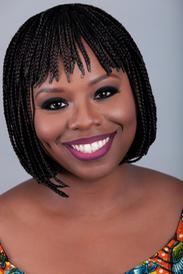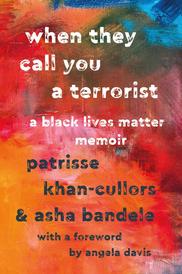
|
|
| photo: Curtis Moore | |
Patrisse Cullors is an artist, organizer and freedom fighter from Los Angeles, Calif. Her memoir, When They Call You a Terrorist (St. Martin's Press, January 16, 2018), is co-authored with asha bandele, with a foreword from Angela Davis. It delves into Cullors's life growing up in working-class black Los Angeles, the prison and police system's impact on her family and community, and her fight back as founder of Dignity and Power Now and co-founder of the Black Lives Matter global network.
On your nightstand now:
Radical Women: Latin American Art, 1960-1985, which documents an art exhibit at the Hammer Museum in Los Angeles showcasing more than 100 women from 15 countries across Latin America. The exhibit is part of a series bridging together Los Angeles with Latin America, and as an artist, I have enjoyed learning more about artists and particularly women in the Americas.
Favorite book when you were a child:
The Gold Cadillac by Mildred D. Taylor was the first time I read about the civil rights movement in a children's book. It spoke to me because it put into perspective what it meant for a black family in the South to exist and what it meant for this family to drive a fancy car but still be subject to policing and discrimination. Taylor made the relationship between police and the black community clear and it was important to my development.
Your top five authors:
I love Octavia Butler because her characters are dynamic, Afro-futurist, and she invites us in her literature to engage with new narratives on what it means to be human. She was a pioneer for black women artists and organizers who, like myself, imagine other worlds.
I first read Toni Morrison's The Bluest Eye as a student at Cleveland High School in the Humanities Magnet. The way she captures the condition of black girlhood and violence spoke to me. Her writing paints pictures in way that expose the harm, pain yet are powerfully redeeming.
Brittney Cooper, co-founder of the Crunk Feminist Collective, is someone that I've adored even before I met her on the ground in Ferguson, Miss. Her writing is so incredibly raw and deeply analytical. How she conveys feminism really drew me in, she doesn't hold back and speaks about black women, our realities and more poignantly.
Marge Piercy's Woman on the Edge of Time talks about the mental health system and especially hones in on women's experience. Once I found her, I read all her books, and she is brilliant. She sets light on this demagogue system and allows for a new conversation about mental health and women, juxtaposing our harsh realities with an utopian society.
asha bandele is one of the greatest writers of our time because she is able to capture emotion and complex political content. She is a powerhouse and changing how we understand the written word, policing and over incarceration and their impacts on the black community.
Book you're fake reading:
Lol! I've never faked reading a book!!! Book you're an evangelist for:
Book you're an evangelist for:
Anything written by Octavia Butler, but specifically Parable of the Sower because of how she is able to project our present day into the future and examine possibilities where we have challenges seeing them today. She's helped me reflect on the very essence of the work I do and what I do it for.
Book you've bought for the cover:
The original cover of Fledgling by Octavia Butler featuring a little black girl with a white dress with burnt hems. First, I love when black people are on book cover and, two, it's mysterious. I wasn't sure what I was stepping into.
Book you hid from your parents:
Anything related to magic. I grew up Jehovah's Witness and we weren't encouraged to read anything that wasn't the Bible or written by the Jehovah's Witness leadership. Magic was forbidden, but I was obsessed with the supernatural and would often hide those books from my mother.
Book that changed your life:
Woman on the Edge of Time transformed how I understand and organize around issues of state sanctioned violence, the prison industrial complex and deepened my understanding of feminisms rooted in black and brown experiences.
Favorite line from a book:
"When your rage is choking you, it is best to say nothing," wrote Octavia Butler in Fledgling, and this is something that I have carried with me ever since I read these lines. I can imagine moments when our collective rage feels at capacity and sometimes we are without words and sometimes it is better to say nothing; however, we must always act and Butler's literature feels like a call to action for what we can imagine and against our greatest fears.
Five books you'll never part with:
Fledgling and Parable of the Sower by Octavia Butler, A Taste of Power by Elaine Brown, Woman on the Edge of Time by Marge Piercy and Autobiography of Malcolm X are for me some of the most critical literature in this political moment. Some are contemporary and others are less so; however, these books are powerful, they tell stories about humanity in creative ways, they're page-turning and make you want to read more and inspire us to do better.
Book you most want to read again for the first time:
Kindred by Octavia Butler is another classic, and somewhat different than the rest of her literature since it's also a very historical text placed in the antebellum South, but with a time travel twist. The protagonist's journey and her struggle between past and present has always stayed with me and I wish I could go back to the first time I flipped through each page.

